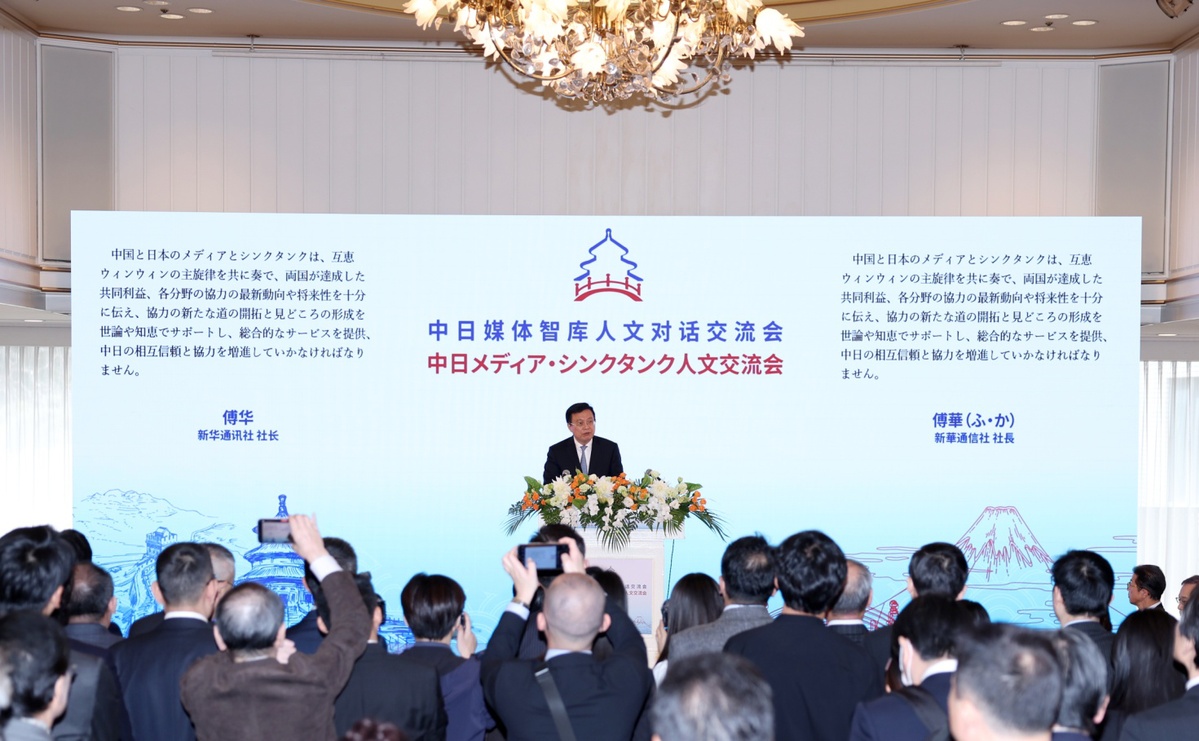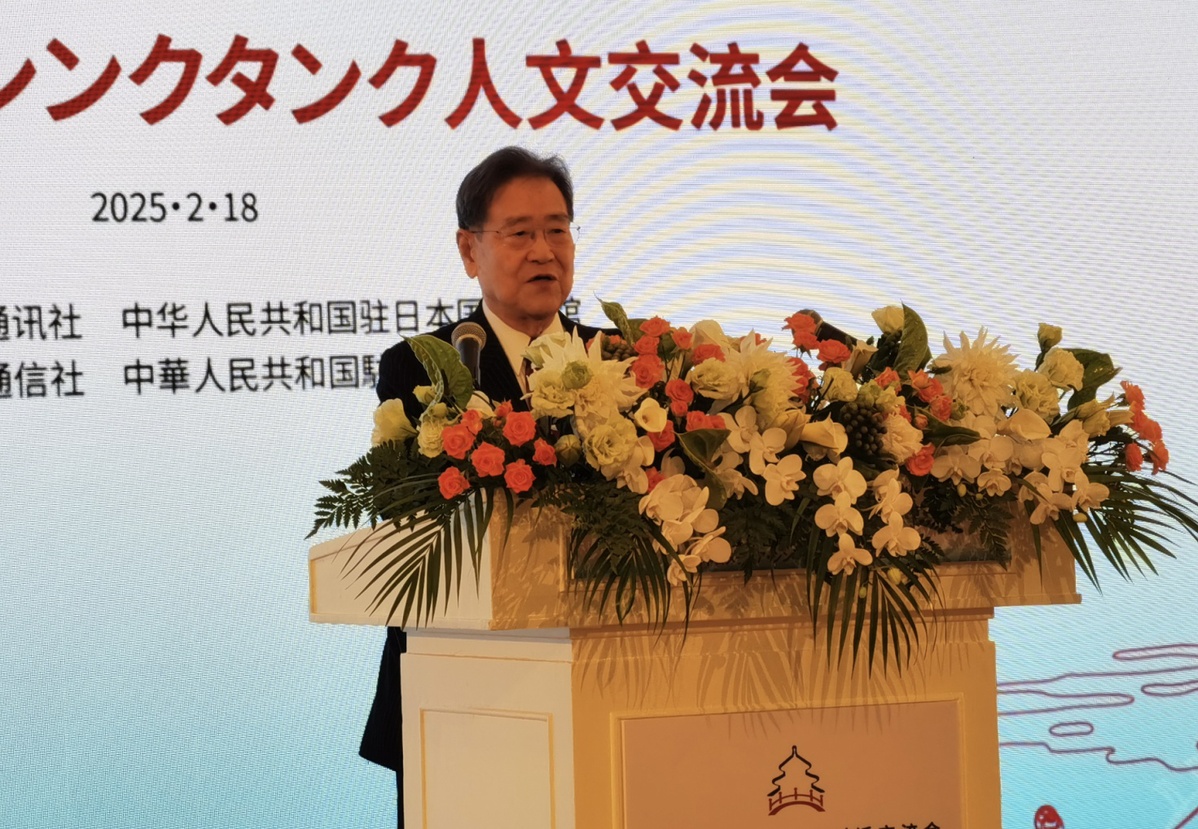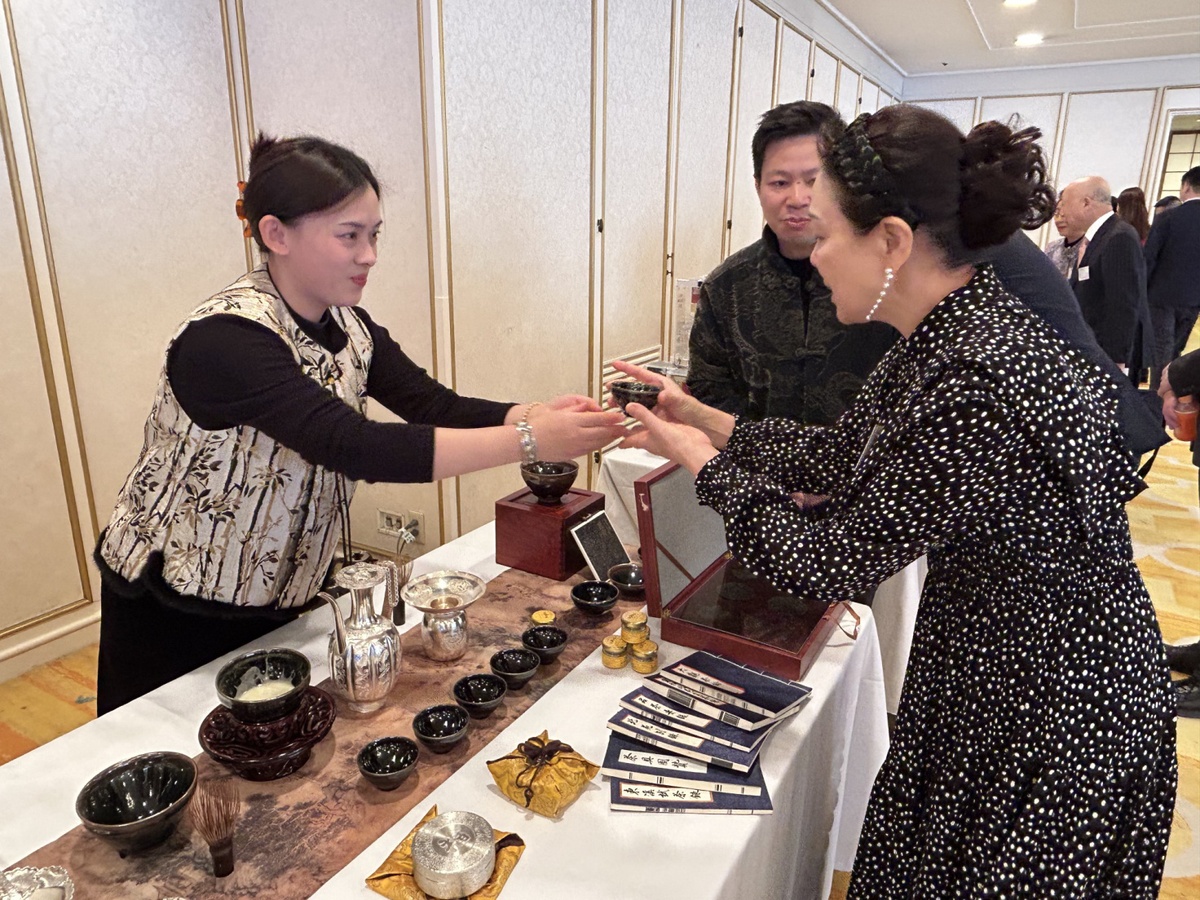
Fu Hua, president of Xinhua News Agency, delivers a keynote speech on Feb 18 in Tokyo at a dialogue on promoting people-to-people and cultural exchanges between media organizations and think tanks of China and Japan. XINHUA
A dialogue focused on enhancing people-to-people and cultural exchanges between media organizations and think tanks from China and Japan was held in Tokyo on Tuesday. The event underscored the need for collaboration in promoting peaceful coexistence, fostering generational friendship and deepening mutually beneficial cooperation.
Jointly hosted by Xinhua News Agency and the Chinese embassy in Japan, the gathering brought together around 160 representatives from media organizations, think tanks and other friendly circles from both countries.
Fu Hua, president of Xinhua News Agency, emphasized in his speech that media and think tanks in both China and Japan should take the lead in fostering bilateral friendship. To advance China-Japan relations, he said "media and think tanks must stay attuned to the times, build on past achievements, fulfill their responsibilities, and actively contribute to the continuous progress and effectiveness of cultural exchanges".

Takeshi Noda, president of the Japan-China Society, speaks at an event in Tokyo on Feb 18 aimed at fostering people-to-people and cultural exchanges between media organizations and think tanks from China and Japan. Co-hosted by Xinhua News Agency and the Chinese embassy in Japan, the gathering brought together around 160 representatives from media organizations, think tanks, and other friendly circles from both countries. Jiang Xueqing / China Daily
He underscored the role of media and think tanks in effectively reporting on the two nations' vibrant practices to maintain peace and promote peaceful development. By doing so, he noted, they could inject positive momentum into the stability, prosperity and development of Asia and the world.
Fu also highlighted the importance of fostering an accurate mutual understanding between the two countries. He urged the media and think tanks to share compelling stories of people-to-people exchanges, helping to forge closer connections between citizens and reinforcing the grassroots foundation of China-Japan friendship.
Additionally, he stressed that media and think tanks should showcase the common interests already established between China and Japan, highlight the latest developments across various fields of cooperation, and shed light on potential areas for future collaboration.

A participant in the dialogue (right) receives a cup of Beiyuan Tribute Tea, a specialty from China's Fujian province, from a staff member in the event's exhibition area in Tokyo on Feb 18. Jiang Xueqing / China Daily
Chinese Ambassador to Japan Wu Jianghao said that China-Japan relations are currently at a critical stage of improvement and development. He noted that while positive interactions between the two countries at various levels and across multiple fields are increasing, there also remain significant contradictions and differences that need to be properly managed.
"The most important task for both sides is to swiftly implement the key consensus reached by the leaders of China and Japan, maintain strategic focus, stay on the right course, uphold the political foundation of bilateral relations, prevent external disruptions, and work toward building China-Japan relations that meet the demands of the new era," said Wu.
In December, the two countries held the second meeting of a high-level consultation mechanism on people-to-people and cultural exchanges between China and Japan in Beijing. Both sides reached a broad consensus on deepening cooperation in fields such as media, think tanks, and youth exchanges and made plans for advancing cultural exchanges between the two countries.
Looking ahead to the New Year, Wu expressed his hope that China-Japan people-to-people and cultural exchanges would achieve even greater progress. He encouraged all participants to use the current dialogue as an opportunity to make further efforts toward improving China-Japan relations.
Takeshi Noda, president of the Japan-China Society, noted that as neighboring nations, it is natural for China and Japan to experience both periods of harmony and moments of disagreement.
Emphasizing the need for a win-win dynamic, Noda underscored the importance of open dialogue in allowing people from both countries to share perspectives, overcome misunderstandings, and work together toward a deeper mutual understanding.

Panda toys are displayed at the event in Tokyo on Feb 18 to promotes giant panda culture and global exchanges. Jiang Xueqing / China Daily
"The world is changing rapidly, and political landscapes, including in the United States, are evolving in ways we have never seen before," he said. "In such times of transformation, it is even more crucial for China and Japan to engage in meaningful dialogue. Differences in opinion are inevitable, but rather than avoiding them, we should engage in open discussions and constructive exchanges to find common ground".
Takashi Sasaki, chairman at TBS Holdings, stressed the importance of seizing the current opportunity to strengthen China-Japan exchanges.
"The timing is crucial — we must not let this chance slip away. Now is the moment to revitalize our exchanges," said Sasaki.
He highlighted the significance of people-to-people interactions, emphasizing that while political and economic news is essential, grassroots exchanges also play a vital role in fostering mutual understanding and warming hearts.
Looking ahead, he stressed the media's responsibility not only to report on politics and the economy but also to spotlight the human connections that bring the two nations closer.
"The more active people-to-people exchanges become, the deeper our mutual understanding grows. There have been periods of waned interaction, but that only reinforces the need to redouble our efforts," he said.
jiangxueqing@chinadaily.com.cn